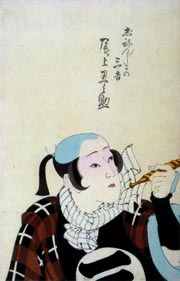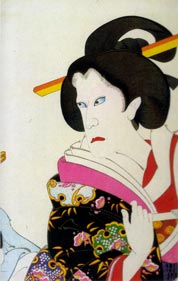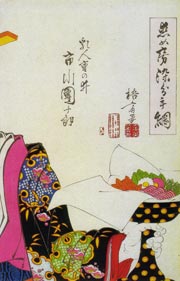| SHIGENOI KOWAKARE |
| Play title | Koi Ny˘b˘ Somewake Tazuna The Loving Wife's Particolored Reins [1] |
| Authors | Miyoshi Sh˘raku Yoshida Kanshi I [2] |
| History |
The play "Koi Ny˘b˘ Somewake Tazuna" was originally written for the puppet theater (Bunraku) and staged for the first time in the 2nd lunar month of 1751 in ďsaka at the Takemotoza. It was adapted for Kabuki a few months later and staged for the first time in the 7th lunar month of 1751 in Edo at the Nakamuraza [casting]. The first actors to perform the roles of Shigenoi and Sankichi in the "Shigenoi Kowakare" act were Segawa Kikujir˘ I and Segawa Kichiji II. |
| Structure |
The drama "Koi Ny˘b˘ Somewake Tazuna" is made up of 13 acts. "Shigenoi Kowakare" is the tenth act. |
| Key words |
Gidayű Ky˘gen Giri/Ninj˘ Iyajahime Kar˘ Koshimoto Kowakare Menoto Sugoroku T˘kaid˘ Umakata |
| Summary |
The character Shigenoi is a wet-nurse who looks after the young princess Shirabe. Shirabe's father is lord Yurugi who, as part of a political alliance, is marrying off his daughter to the son of another lord in the East. However, princess Shirabe is refusing to go, and her stubbornness is proving extremely trying for all the other members of the household, Shigenoi included. It is just at this moment that another lady enters with a suggestion which may persuade the princess to change her mind. The lady reports that a boy of around ten years old is playing a game of sugoroku just outside, and he's playing it with a picture of the T˘kaid˘ Highway, the very highway along which Shirabe is to travel. The boy, a young pack-horse driver called Sankichi, is brought in and ordered to teach the young princess how to play the game. They all begin playing excitedly and it isn't very long before, unsurprisingly, the princess wins. She never knew that travelling to the East could be such fun and she is now eager to depart. Shigenoi is relieved and grateful to the boy whom she intends to reward. Members of the household all retire to get ready for the journey. Shigenoi then re-enters with a tray of sweet cakes that she intends for Sankichi, and during the following exchange it transpires that the boy is none other than her own son whom she was forced to give up at birth. Sankichi is overjoyed at having found his real mother and his only remaining wish is that his father might also be found so that the three of them can live as one family. But this can never be. Shigenoi is shocked at first, and though she would love to hold the boy in her arms, she knows that she cannot. If word were to leak out that princess Shirabe and a humble pack-horse driver shared the same mother's milk at birth then there'd be no telling what terrible consequences would result. Shirabe is about to be married for political reasons and her reputation must be above reproach. It is this situation that gives rise to the heart-rending tragedy, for Shigenoi must, once more, give up her child for the sake of duty. She explains to Sankichi that they can never be mother and child in this world and that he must leave the mansion at once. Courtesy of Paul M. Griffith |
| Comments |
It's this kind of extreme, unnatural sacrifice that Westerners find not only hard to agree with, but also difficult to believe. Some may find the play unconvincing as a whole simply because the story is too "preposterous". Yet such situations were quite possible in the feudal period of the past, and plays like this are in effect a criticism of the code of behaviour that would force a mother even to discard her own child out of loyalty to her lord. In fact, such criticism is given openly in the lines of the chanter. Once the historical situation is accepted as true, then this play becomes one of the most moving and horrifying scenes in Kabuki. Courtesy of Paul M. Griffith |
| Notes |
[1] The title "The Loving Wife's Particolored Reins" comes from osakaprints.com. [2] The pen name of the famous puppeteer Yoshida Bunzabur˘ I. |
| Trivia |
Princess Shirabe is nicknamed iyajahime, literally "Princess I-don't-want", because she keeps on saying "iyaja iyaja", which means "I don't want (to go) I don't want (to go)". |
 |
 |
 |
|
The actors Onoe Ushinosuke II and Ichikawa Danjűr˘ IX playing the roles of Sankichi and Shigenoi in the drama "Koi Ny˘b˘ Somewake Tazuna", which was staged in May 1892 at the Kabukiza (print made by Migita Toshihide) |
||
|
|
| Contact | Main | Top | Updates | Actors | Plays | Playwrights | Programs | Links | FAQ | Glossary | Chronology | Illustrations | Prints | Characters | Derivatives | Theaters | Coming soon | News |